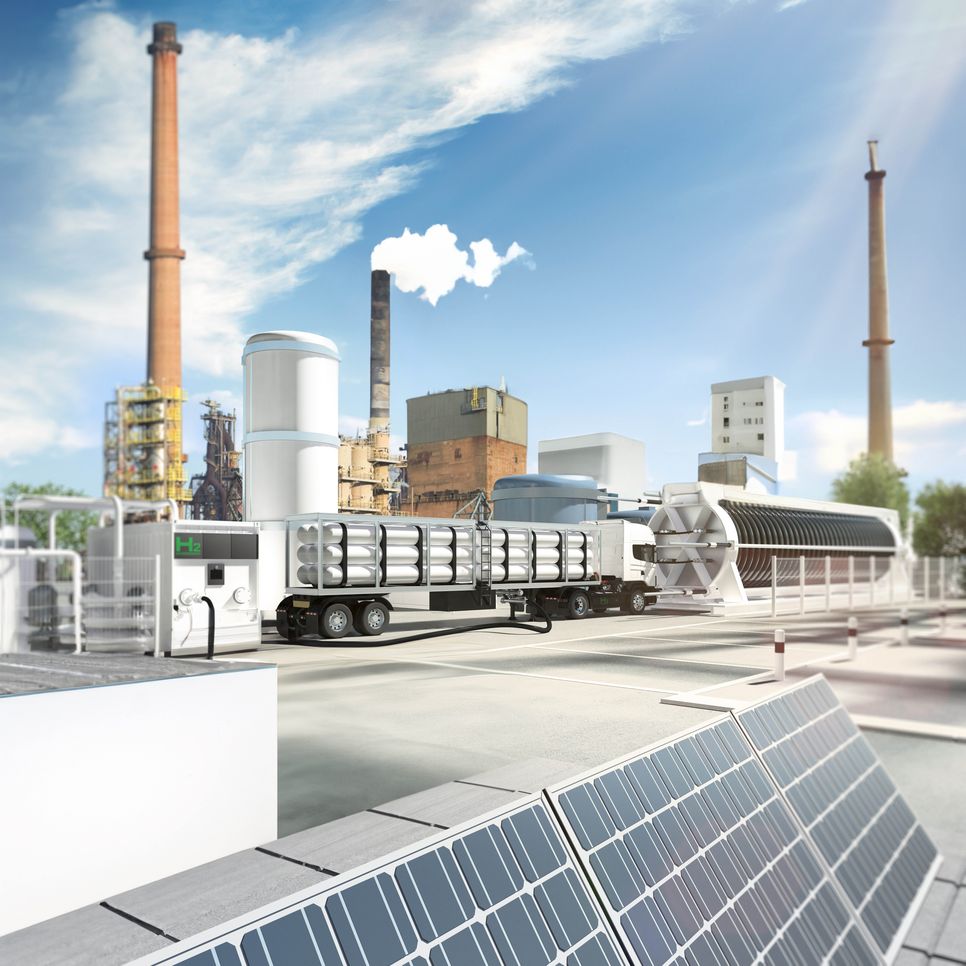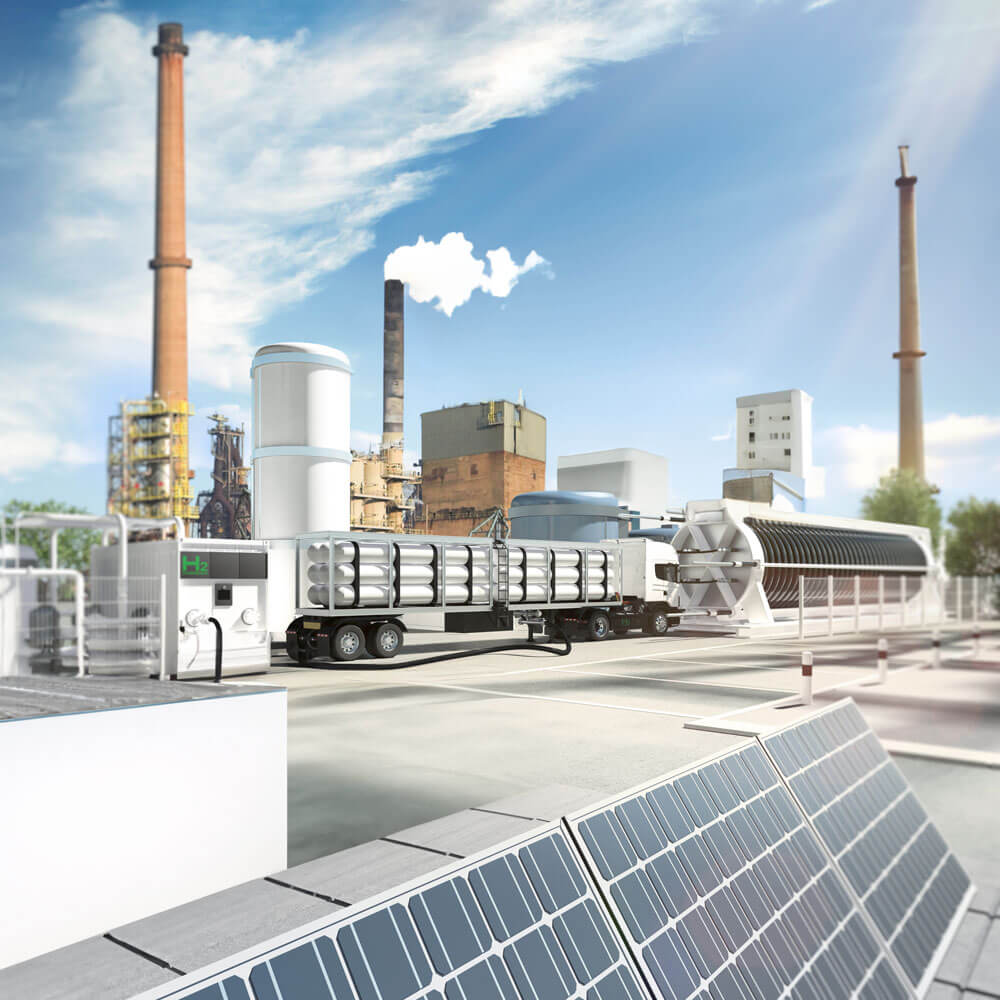
Osnabrück/Oldenburg, 22 September 2023
Hydrogen joint venture in the Osnabrück region: Feasibility study completed
• Georgsmarienhütte, KME Germany, KNI, Q1 Energie and EWE plan joint hydrogen projects
• Feasibility study recommends hydrogen production plant on KME site with oxygen and heat reuse
• Green hydrogen to be used in Osnabrück industry and mobility
The companies Georgsmarienhütte, KME Germany, Q1 Energie, EWE and the Kompetenznetz Individuallogistik e.V. want to jointly implement hydrogen projects in the Osnabrück economic region and thus advance the transformation of the area towards climate neutrality. Within the framework of the “H2 Alliance Osnabrück”, the partners are planning, among other things, the construction of a hydrogen production plant that can supply the trucks drumming station for the mobile supply of the planned Q1 hydrogen filling station. The service station will be able to deliver green hydrogen to the vehicles of KNI member companies from the logistics sector and all other hydrogen-powered cars. There are also plans to connect Georgsmarienhütte and KME Germany to the hydrogen production plant.
The results of the first feasibility study are now available as a basis for the development of the actual project. The study was carried out by APEX, a company specialising in the development of hydrogen plants, and Plant Engineering, an engineering firm experienced in the planning and construction of hydrogen technology and energy production plants.
Hydrogen production on the KME Germany site
The study shows that the site on the premises of KME Germany is well suited for the production of hydrogen. Given the conditions on site, an electrolysis plant with a capacity of up to 15 megawatts could be built in the first stage of expansion and scaled up as the hydrogen economy ramps up.
A plant of this size would produce enough green hydrogen to meet the expected demand of mobility customers in Osnabrück and the surrounding area and also provide hydrogen for other industrial applications.
Reuse of oxygen and heat from the electrolysis process
In the electrolysis process, oxygen is produced in addition to hydrogen. This could be stored on the KME Germany site and used for copper production.
The heat produced during the electrolysis process could be raised to a higher temperature with the help of a heat pump and then used at the KME Germany site or – if available in the future – fed it into a local district heating network.
Joining forces for hydrogen ramp-up in the Osnabrück economic region
The partners agree that the energy turnaround, and thus the move away from fossil fuels, is only feasible with the help of hydrogen. However, many actors are needed to jointly advance hydrogen projects and to animate the national hydrogen strategy. Marc-Oliver Arnold, Technical Managing Director of Georgsmarienhütte GmbH and representative of the consortium: “We are joining forces with partners to pool our strengths and expertise along the entire value chain and jointly driving market entry forward, from the production of green hydrogen, through to transport and storage and its use in industry and mobility. We are pleased that the results of the feasibility study provide us with an initial trend-setting path to drive the energy future of our Osnabrück economic region, together with KME Germany, Q1 Energie, the Kompetenznetz Individuallogistik e.V. and the energy service provider EWE”.
With the results of the first feasibility study, partner EWE is now also starting the commissioning process for the acquisition of funding. “We cannot implement such a large-scale infrastructural project on our own. After all, the investment is estimated at more than 30 million euros. With the appropriate funding, the economic framework would be in place and the further planning and investigations can begin. We are in the starting blocks and are hopeful that our joint project will be convincing”, says EWE Project Developer Dr. Dennis Wenzel. The consortium does not expect a decision before summer 2024. According to the study, realisation of the project would then be possible within two and a half years.
The work of the partners in the “H2 Alliance Osnabrück” is complemented by the plans of the GMH Group and EWE. A few weeks ago, the two companies signed a declaration of intent to supply and use green hydrogen in steel production. The aim is to reduce Georgsmarienhütte’s CO2 emissions. By 2039, production should be climate-neutral. With its planned infrastructure, particularly in the area of hydrogen storage and pipeline-based hydrogen transport, the energy service provider EWE offers the basis to supply industrial consumers such as Georgsmarienhütte with hydrogen from renewable energy on a large scale in the future, safely and in line with demand.
Anna Kebschull, District Administrator of the Osnabrück district, on the hydrogen activities in the Osnabrück economic region: “I am very pleased that the H2 Alliance is driving the transformation towards climate neutrality. The companies’ projects are also a very important pillar in terms of securing the location, because only with green and affordable energy will energy-intensive industries have a successful future in the Osnabrück region. The results of the feasibility study establish another important foundation for this.”
About Georgsmarienhütte
Georgsmarienhütte GmbH, based in Georgsmarienhütte, Lower Saxony, is a leading European supplier of crude steel, steel bars and bright bars based on quality and engineering steels. In addition, the company supplies machined and ready-to-install components. Already today, Georgsmarienhütte is one of the most climate-friendly steel companies in Germany. With its comparatively low-CO2 value chain, which consists of melting scrap in the electric arc furnace and recycling it into new steel, the company is a pioneer in sustainable steel production, making an important contribution to the circular economy. The methodology used by Georgsmarienhütte to calculate its Product Carbon Footprint (PCF) has been validated by TÜV SÜD and is now being applied to more than a thousand steel variants. Besides the automotive industry and its suppliers, Georgsmarienhütte serves customers in the mechanical and plant engineering and energy industry. Steel made in Georgsmarienhütte is used where exceptional stresses have to be coped with, where power is generated and immense forces have to be transmitted, and where safe and wear-resistant operation is essential. More information is available at www.gmh.de.
About KME Germany
KME is one of the world’s largest manufacturers of copper and copper alloy products. The company has eight production sites in Europe’s most important markets, as well as in China. The largest plant is located in Osnabrück, Germany. KME products are used in a wide range of innovative technical equipment and applications such as modern communications technology, the automotive industry and power and electrical engineering.
About KNI – Competence Network Individual Logistics
The Kompetenznetz Individuallogistik e.V. is an association of various logistics companies, universities and public institutions in the Osnabrück, Münster and Bielefeld region. The different bodies specialise in developing individual concepts for their customers’ logistics requirements. The KNI is committed to providing answers to logistical questions that are innovative, sustainable and environmentally conscious, and implementing them regionally. The logistics sector is one of the region’s most important industries.
About Q1 Energie AG
Q1 is an independent medium-sized German energy supplier that provides customers with fuel and energy at more than 230 service stations nationwide. Q1 also provides market-leading lubricants for cars, trucks and industry uses. With innovative energy solutions for e-mobility, LNG and photovoltaics, the company is a major contributor to sustainable mobility. First-class service and a motivated team underline the brand’s promise of ‘quality first’.
About EWE
As an innovative service provider, EWE is active in the business areas of energy, telecommunications and information technology. With over 9,500 employees and a turnover of 6.1 billion euros in 2021, EWE is one of the largest energy companies in Germany. The company, headquartered in Oldenburg in Lower Saxony, is predominantly municipally owned. It supplies around 1.4 million customers with electricity, around 0.7 million with natural gas and around 0.7 million with telecommunications services in northwest Germany, Brandenburg, Rügen and parts of Poland. EWE plays a pioneering role in the areas of supply security, climate protection and digital participation. To this end, the group is investing over one billion euros in the expansion of the fibre optic infrastructure in the coming years, four billion euros in the construction of new wind power plants and is a leader in the expansion of the hydrogen infrastructure. You can find out more about EWE at www.ewe.com.
Graphic: © EWE/Litho Niemann + M. Steggemann
Media contacts:
Georgsmarienhütte GmbH
Marcus Wolf
Communications
T. +49 5401/39-4910
M. marcus.wolf@gmh-gruppe.de
bmb-consult – PR-agency GMH Gruppe
Dagmar Klein
Managing Director
T. +49 89 8950159-13
d.klein@bmb-consult.com
KME Germany GmbH
Birger Rotert
Leiter zentrale Dienste
T. +49 541 321-2280
M. birger.rotert@kme.com
KNI – Kompetenznetz Individuallogistik e.V.
Christina Suthe
Leiterin der KNI-Geschäftsstelle
T. + 49 1590 4900601
M. c.suthe@k-n-i.de
Q1 Energie AG
Alina Moldenhauer
Öffentlichkeitsarbeit
T. +49 541 602-162
M. a.moldenhauer@q1.eu
EWE AG
Nadine Auras
Pressesprecherin
T. +49 3341 382-103
M. nadine.auras@ewe.de

The H2 Alliance Osnabrück aims to help achieve climate neutrality in the region with key hydrogen projects.